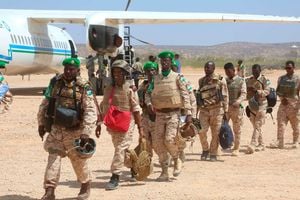Prime
Museveni to mediate Sudan, Ethiopia conflict

President Museveni (5th right) with the Igad delegation led by Dr Workneh Gebeheyu, the executive secretary (centre), at State House in Entebbe last Thursday. PHOTO/COURTESY
What you need to know:
- Igad requested the President to mediate because of his experience in leadership and conflict resolution.
President Museveni has accepted the request by the Inter-Governmental Authority on Development (Igad) to host the regional Heads of State Summit in Kampala next month.
The summit seeks to find a permanent solution to the conflicts in South Sudan, Sudan, and Ethiopia.
The executive secretary of Igad, Dr Workneh Gebeyehu, and his team met the President last Thursday and requested him to take the lead in ensuring peace and stability in the region.
Mr Faruk Kirunda, the deputy presidential press secretary, yesterday confirmed the meeting.
“The executive secretary of Igad requested the President to intervene and help Igad find a long-lasting solution to conflicts in some of its member states and he agreed to do so,” Mr Kirunda said.
“They asked the President to intervene and help resolve the conflicts because of his experience in leadership and conflict resolution but he said he can’t do it as singlehandedly, he needs to engage other leaders in the region,” he added.
Mr Kirunda said the President told Igad delegation that he had been advocating for the return of peace and stability in the Great Lakes region for a long time.
“He told them that he has many engagements at the moment and won’t be able to travel to the affected countries. The President, however, requested to host all the parties in Uganda,” he said.
In the meeting, Mr Museveni said he wanted to see a more coordinated and enhanced approach in dealing with important issues.
This publication understands that the President promised to reach out to other leaders in the Great Lakes to find solution to the instability in some of the member states.
Mr Gebeyehu and the President also discussed issues pertaining to regional peace, stability, economic integration, and response to the Covid-19 pandemic.
Mr Kirunda said during the meeting, Mr Museveni wanted to see a more coordinated and enhanced approach in dealing with important issues.
Discussions on water resources
Last week, after opening a three-day dialogue on the pivotal role underground water plays in resolving conflicts, Dr Gebeheyu also paid a courtesy call to Mr John Mulimba, the State Minister for foreign Affairs in charge of Regional Cooperation.
“Uganda is a member of Igad and I am pleased to have met the minister here, we have discussed a number of issues of concern and we are grateful to his President Museveni, we expect that he will provide his wisdom and leadership to help resolve these issues,” Dr Gebeheyu.
Dr Gebeheyu said groundwater resources can be an instrument to enhance regional peace and security.
“It is said water is the new oil and is set to increasingly become the source of new and future conflicts. The Igad region has been affected by disagreements over water not only at inter-communal level in the borderlands, but more significantly, at regional level over riparian water rights along the Nile, whose sources are in two of our member states,” he said.
Dr Gebeheyu also presented awards to eight Ugandan youths who made outstanding short videos explaining the causes of conflict in communities.
Igad was created in 1996 to supersede the Intergovernmental Authority on Drought and Development (IGADD), which was founded in 1986 to mitigate the effects of the recurring severe droughts and other natural disasters.
State of affairs
Since November 2020, the Ethiopian and Eritrean government forces have been fighting rebel forces in the northern Tigray region of the populous country in the Horn of Africa where thousands of people have died and others living in famine conditions.
Since 2011, South Sudan has also been embroiled in internal war emanating from the management of natural resources and oil and gas revenues.
In 2019, the 30-year iron fist rule of president Omar al-Bashir plunged the Sudan, into chaos following protests that led to his down fall following the persistent rise in bread prices, which caused a popular uprising.




